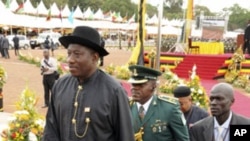Nigerian President Goodluck Jonathan says he is taking charge of the country's economic planning.
Nigerian President Goodluck Jonathan says he will lead Nigeria's economic team in his new Cabinet, replacing the finance minister as the country's chief financial planner.
Jonathan says he will push to raise import tariffs on rice and sugar to better protect domestic producers, with the goal of ending all rice imports within four years. The president says Nigeria will never be a leading economy if it continues to import basic commodities such as oil and food, and does not increasing the local value added to agriculture, solid minerals, and oil and gas.
In a meeting with business leaders, Jonathan recommitted himself to improving the supply of electricity.
Former military leader Yakubu Gowon says more reliable energy will help both Nigerian consumers and producers.
“I think Nigerians will feel they have been offered a better deal when the energy situation improves and security of lives and property is guaranteed across the federation,” he said.
Gowon says the new Nigerian government must also attack what he calls the “canker worm” of corruption.
Delta State University Political Science Lecturer Benjamin Agah says there are plenty of investigations into official corruption, but not yet sufficient prosecution.
“Once somebody has been established to have been guilty of an offense, he should be tried. And when he is found guilty, he should be dealt with. Corruption, without fighting it to the barest minimum, there is no way we can develop,” said Agah.
Public affairs analyst Kole Shettima says the biggest problem for President Jonathan is the disconnect between nine percent economic growth and the living conditions of the poor.
“The president has to intervene decisively in terms of either public work activities or in terms of redistribution policies that will aim at improving the quality of the life of ordinary people,” he said. “Otherwise we have a situation whereby the gap between the rich and poor is increasing.”
That gap is especially prominent between northern Nigerians, most of who voted for President Jonathan's opponent, and southern Nigerians, who guaranteed his election. With per-capita GDP in the north, half that of the south, Shettima says greater economic equality would go a long way to resolving this often-violent division.
“This phenomenon of a country which is so widely divided is going to be one of the major challenges that is going to be facing the country, as well as the income differential among the rich and the poor are certainly issues that the president has to address,” said Shettima.
Agriculture accounts for more than 40 percent of Nigeria's gross-domestic product, but output remains low. So Shettima says greater federal investment in the north, including timely access to fertilizers and more stable prices for farmers would help diversify a largely oil-dependent economy.
Higher crude prices are helping fund public infrastructure. But President Jonathan says Nigeria must be careful not to overspend. He is cutting this year's federal budget from $31 billion to $28 billion.
Financial analysts believe the new Jonathan administration should get off to a strong start with the stability of a sovereign wealth fund, solid returns from the banking sector, and progress on long-delayed legislation to restructure the national petroleum corporation.




